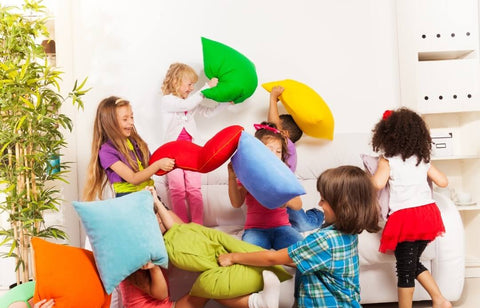Empowering Playfulness : The Surprising Benefits of Rough & Tumble Play

Play fighting, wrestling or rough-housing is considered by many to be undesirable behaviour that should be discouraged. Far from it, rough-housing is not only developmentally appropriate and normal for most girls and boys, it offers a wide range of benefits for growth and learning.
Let's take a closer look at what children have to gain when they engage in this type of play.
Developing Body Awareness & Gross Motor Skills

Active exploration is the best way for children to develop body awareness - that is, the ability to coordinate vision, muscle control and movement planning. Play that engages the whole body in a variety of ways helps kids gain a better understanding of their physical capabilities (and limitations) while simultaneously enhancing gross motor skills such as strength and balance.
Building Fine Motor Skills
Fine motor skills involve the coordination and control of smaller muscle groups, particularly those in the hands and fingers. These abilities are needed for a wide range of tasks, such as writing, and using tools with precision. While rough-housing mostly involves gross motor movement, it is also engaging the arm and hand muscles that are crucial for fine motor skills. As they wrestle, children use their hands to push, pull, grab, and hold onto objects or playmates. These actions promote the development and refinement of grip strength, dexterity and hand-eye coordination necessary for fine motor mastery.
Supporting Cognitive Development
Rough and tumble play not only contributes to physical development but also builds on children's cognitive abilities. Through interaction and collaboration, they engage in problem-solving, strategizing, and decision-making. This type of dynamic play requires children to navigate rules, encourages them to think critically, plan ahead, and quickly adapt to changing circumstances, thereby promoting cognitive flexibility. They are literally practising "thinking on their feet".

Cultivating Confidence, Resilience & Independence
Risk-taking is an inherent part of rough and tumble play. As children engage in play scenarios where they need to test their physical boundaries, they learn to assess risks and make decisions accordingly. This experience helps them develop confidence in their abilities, as they realise their capacity to navigate and overcome challenges. They are also building resilience, learning to bounce back from minor bumps and bruises, which teaches them that setbacks are a part of life and can be overcome. Their sense of independence is enhanced as they experiment with autonomy and self-reliance through exploration and decision-making.
Promoting Social, Emotional & Communication Skills
Play fighting provides an avenue for social and emotional growth. This type of game can involve reading non-verbal cues, interpreting body language, and understanding boundaries. Through negotiation and cooperation, children develop valuable social skills, such as listening, taking turns, and resolving conflicts. Meanwhile, engaging in verbal exchanges, negotiating rules, and expressing ideas and emotions all help to improve language and communication.
Fostering Empathy & Understanding Consent
 Rough-housing games are a great opportunity for teaching the concepts of empathy and consent. When engaging in physical play together, children can develop their sense of empathy by noticing their playmates' reactions and listening to their feelings. And while witnessing children navigate these aspects of the game, caregivers can start conversations around consent, bodily autonomy, and respecting the boundaries and comfort levels of others.
Rough-housing games are a great opportunity for teaching the concepts of empathy and consent. When engaging in physical play together, children can develop their sense of empathy by noticing their playmates' reactions and listening to their feelings. And while witnessing children navigate these aspects of the game, caregivers can start conversations around consent, bodily autonomy, and respecting the boundaries and comfort levels of others.
Hopefully I have shed a little light here on the multitude of developmental benefits that can come from play-fighting and rough games. By recognizing the value of this vibrant and dynamic form of play, caregivers and educators may be more willing to allow this form of play, (within reasonable, safe boundaries), as they endeavour to create an environment where children can thrive physically, emotionally, and socially.
Play fighting, wrestling or rough-housing is considered by many to be undesirable behaviour that should be discouraged. Far from it, rough-housing is not only developmentally appropriate and normal for most girls and boys, it offers a wide range of benefits for growth and learning.
Let's take a closer look at what children have to gain when they engage in this type of play.
Developing Body Awareness & Gross Motor Skills
Active exploration is the best way for children to develop body awareness - that is, the ability to coordinate vision, muscle control and movement planning. Play that engages the whole body in a variety of ways helps kids gain a better understanding of their physical capabilities (and limitations) while simultaneously enhancing gross motor skills such as strength and balance.

Building Fine Motor Skills
Fine motor skills involve the coordination and control of smaller muscle groups, particularly those in the hands and fingers. These abilities are needed for a wide range of tasks, such as writing, and using tools with precision. While rough-housing mostly involves gross motor movement, it is also engaging the arm and hand muscles that are crucial for fine motor skills. As they wrestle, children use their hands to push, pull, grab, and hold onto objects or playmates. These actions promote the development and refinement of grip strength, dexterity and hand-eye coordination necessary for fine motor mastery.
Supporting Cognitive Development
Rough and tumble play not only contributes to physical development but also builds on children's cognitive abilities. Through interaction and collaboration, they engage in problem-solving, strategizing, and decision-making. This type of dynamic play requires children to navigate rules, encourages them to think critically, plan ahead, and quickly adapt to changing circumstances, thereby promoting cognitive flexibility. They are literally practising "thinking on their feet".

Cultivating Confidence, Resilience & Independence
Risk-taking is an inherent part of rough and tumble play. As children engage in play scenarios where they need to test their physical boundaries, they learn to assess risks and make decisions accordingly. This experience helps them develop confidence in their abilities, as they realise their capacity to navigate and overcome challenges. They are also building resilience, learning to bounce back from minor bumps and bruises, which teaches them that setbacks are a part of life and can be overcome. Their sense of independence is enhanced as they experiment with autonomy and self-reliance through exploration and decision-making.
Promoting Social, Emotional & Communication Skills
Play fighting provides an avenue for social and emotional growth. This type of game can involve reading non-verbal cues, interpreting body language, and understanding boundaries. Through negotiation and cooperation, children develop valuable social skills, such as listening, taking turns, and resolving conflicts. Meanwhile, engaging in verbal exchanges, negotiating rules, and expressing ideas and emotions all help to improve language and communication.

Fostering Empathy & Understanding Consent
Rough-housing games are a great opportunity for teaching the concepts of empathy and consent. When engaging in physical play together, children can develop their sense of empathy by noticing their playmates' reactions and listening to their feelings. And while witnessing children navigate these aspects of the game, caregivers can start conversations around consent, bodily autonomy, and respecting the boundaries and comfort levels of others.
Hopefully I have shed a little light here on the multitude of developmental benefits that can come from play-fighting and rough games. By recognizing the value of this vibrant and dynamic form of play, caregivers and educators may be more willing to allow this form of play, (within reasonable, safe boundaries), as they endeavour to create an environment where children can thrive physically, emotionally, and socially.
- The Toy Chest Australia


Comments 0